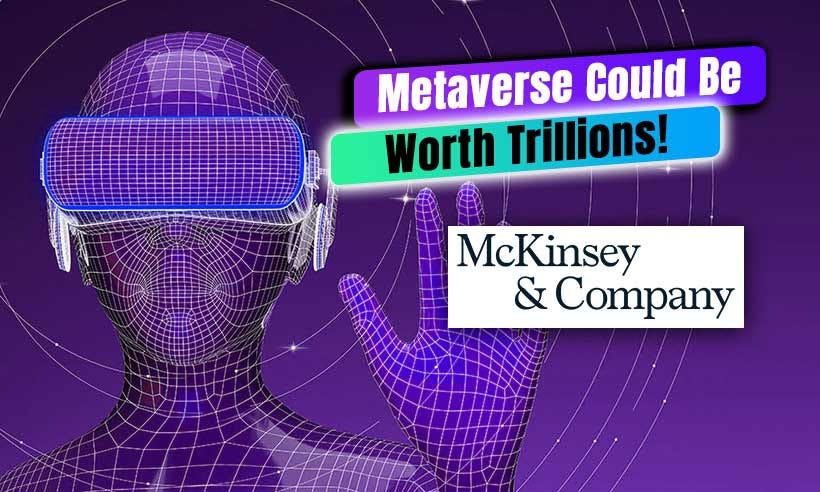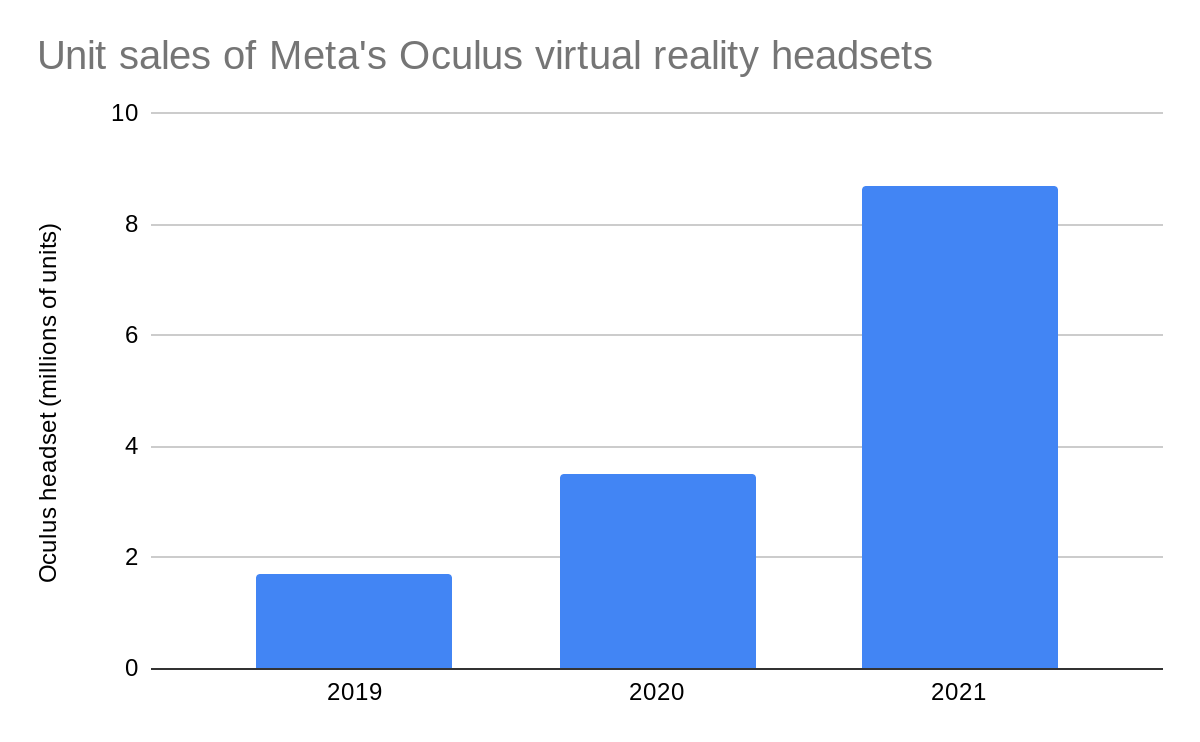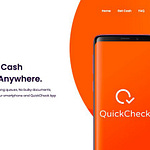I’ve got a confession. (Cue Usher’s hit single “Confessions”)
I am not exactly sure what the metaverse is. There I said it. I feel so much lighter lol :-)
Last year, “metaverse” burst onto our collective lexicon when Facebook announced it was reinventing itself as Meta. Mark Zuckerberg produced an hour-long video explaining what the metaverse was and how Facebook was going to engage in it. I didn’t watch the video then but I did see a few clips. It felt important. I felt like it must be a big deal if one of the world’s richest men was betting his ENTIRE fortune on it. I didn’t want my ignorance to cost me this opportunity.
So I started a little exploration. I spent part of my New Year’s Eve in the Decentraland metaverse. I started buying a few metaverse tokens and invested in a metaverse-themed ETF. During the hype, I even considered buying some virtual land in the metaverse. Now to be clear, my investments were pretty limited…way less than 1% of my portfolio.
But since Facebook’s fateful announcement, the world’s most prestigious investment banks and consulting companies have published a slew of reports on the metaverse opportunity. Citi Bank forecast that the metaverse economy could be worth $13 trillion by 2030. The Boston Consulting Group (BCG) had a less bombastic view, forecasting that the metaverse economy would be worth $1.3 trillion by 2030. To put things in context, in 2021, the total value of the US car and automobile manufacturing market was $83B. The bottom line is this - some smart folks are saying the metaverse could be at least 12 times the US car market in 7.5 years. No one knows the future but there is some consensus that the metaverse could be BIG business.
Ok…you’ve got me interested. But what is the metaverse??
I have been digging trying to learn more. I finally watched the Zuckerberg metaverse video. I listened to a bunch of podcasts, watched more YouTube videos, read some essays, and flipped through a couple of decks. I’m still organizing my thoughts and refining my thinking. Figured it might be helpful to share some of my preliminary thoughts. Let’s go!
What is the metaverse?
High school level definition
The metaverse is a 3D version of the internet. It is a convergence of the physical and digital worlds.
According to Matthew Ball, the metaverse represents the 4th wave of computing. The first three waves were mainframe computing, personal computing and mobile computing. So if the mobile era was defined by easy ability to get online, the metaverse era would be defined by always being online, this is called ambient computing.
College-level definition
According to Roundhill, the metaverse is the successor to the current internet that will be interoperable, persistent, synchronous, open to unlimited participants with a fully functioning economy, and an experience that spans the virtual and 'real' world.
TLDR: the metaverse is an immersive, interactive environment generated by a computer.
What is NOT the metaverse?
Did you notice that none of the definitions mention virtual reality headsets? That was a big surprise to me. I had originally imagined a future where VR headsets became as common as cellphones are today. While I think sales of VR headsets are poised to going to continue rising, they are NOT required to access the metaverse. In fact, some of the closest metaverse-like experiences in gaming are accessible via cell phones.
Side note - my jaw dropped when I recently learned that Meta sold 8.7 million Oculus VR headsets in 2021. That’s more unit sales than Xbox consoles in 2021! Do you have one? I’m thinking about getting one to test it out. Sales of these VR headsets have doubled each year. Now Meta is opening up physical stores so more people can experience it firsthand.
TLDR: VR headsets provide one way to access the metaverse but they won’t be the only way to experience it.
The metaverse must be experienced.
One of my cousins in Nigeria told me how undergrads studying computer science did not have access to computers. They would write computer code by hand on paper and then submit their homework to professors to review. These students did not get the opportunity to actually run the code to see if the code did what it was supposed to do. They did not get to practice how to troubleshoot bugs in the code.
We can all agree that this is a subpar way to learn. I think about the metaverse along similar lines. It’s nice to read and write about it but ultimately one is best served by diving in and playing with the emerging technology. It’s kinda like going back in time to the 1920s and trying to explain the internet to your neighbors. Not easy lol.
Ok. Sounds nice but what problem does the metaverse solve?
I’m still ruminating on this. Right now, I think the metaverse could increase accessibility, remote collaboration, education, gaming, social relationships, industry, and more.
a) Accessibility: One of my friends in college was a fountain of dry jokes and witty takes. She was also a triple major who graduated with a 4.0 GPA. But I’ll never forget when she shared that she sometimes had to drop classes that she wanted to enroll in because the building was not wheelchair accessible. My heart sank. I did not realize that not all buildings on campus were wheelchair accessible or had elevators. This opened my eyes to the inequity of access. I hope the metaverse can extend access to people who might have different mobility abilities. But then I think about people who are visually impaired and hope access is somehow extended to them too.
b) Remote collaboration: I’m tired of Zoom. I love people and I’m energized by engaging with people. But sitting in a chair going back-to-back on never-ending Zoom calls is draining. It’s also often subpar when some coworkers are meeting in person and others are on Zoom. Last year, Bill Gates said that within 2-3 years most work meetings would be held in the metaverse. I laughed when he said it. I still think his timeline is unrealistic. But I hope he is directionally right. I hope a metaverse solution improves the Zoom experience. Perhaps a future where coworkers can use holograms or avatars in 3D to engage with each other and express more body language beyond facial expressions.
c) Education: Let’s face it. Not all teachers are created equal. Some are very engaging and can bring a seemingly dry subject to life. But others struggle to impart knowledge to students. Students have different learning preferences. Students who are strong audio-learners are advantaged in the existing education system. Now imagine if students had the opportunity to travel through time and space to experience natural phenomena and historical events. Imagine if instead of memorizing the planets you could see them close up and see the icy rings around Saturn. Or be on the front row as Abraham Lincoln gave the Gettysburg Address. Imagine if medical students could go on a safari through a human’s veins and arteries to learn about heart disease. These immersive experiences would be resonant and more engaging. Researchers say immersive experiences lead to 30% greater retention. This increased understanding could trigger more technological breakthroughs. I’m excited!
d) Social relationships: When my grandpa went to medical school in England in the 1930s, his letters would travel 6-10 weeks before they reached his parents in Nigeria. Today my family is spread out across Africa, Europe, and North America. Video calls and cell phones have made the world feel much smaller. But I hope the metaverse could take it to the next level. It would be amazing for my parents to have more immersive experiences with their grandchildren. My nieces are becoming more curious about our culture and heritage, it would be amazing if my parents spend even more time with them and give could give them a virtual tour of our ancestral village or the cities they grew up in. Obviously, I don’t think the metaverse would be a perfect substitute for in-person interaction but I think it could be a bridge over oceans and great distances.
e) Industry: According to McKinsey, BMW was designing its most advanced manufacturing plant when a team member suggested they build a virtual replica in the metaverse before beginning construction. So they did! BMW executives and technologists were able to physically tour the metaverse plant. Soon they realized 30% of the design choices were not ideal. They significantly revised the designs before proceeding to construction. Testing it out before construction led to substantial financial cost savings.
Sounds good….what are the downsides?
In life, you gotta take the rain with the sunshine.
a) Terror risks in 3D: Technology is neither good nor bad, it all rests on the application. Unfortunately, bad actors are often early adopters of new technology. Terrorist groups have leveraged Facebook, YouTube, and Twitter to find and radicalize young people. The same may become true in the metaverse. In fact, the metaverse might provide better tools to train terrorists. We will need to develop new counter-terrorism tools.
b) Loss of person-to-person contact. The pandemic illuminated the loneliness crisis in many Western countries. Many of us coped with the social-distancing measures by increasing our time spent on social media. But for thousands of years, humans have needed person-to-person interaction to sustain wellness. It remains to be seen if the metaverse will be able to replicate this interaction.
c) Too much tech. I’m embarrassed by how much time I spend looking at screens. I’m usually working on a laptop, scrolling on my phone, or watching TV on a big screen. No wonder my eye prescription keeps getting progressively worse! Should we be concerned that there is too much technology in our lives? I wonder if the rise of the metaverse will drive the appreciation of natural, in-person activities. It might become a luxury to travel in real life. We might see more people yearning for eco-tourism vacations where they are cut off from technology.
What’s going in the metaverse today?
Do you remember when newspapers uploaded a scanned copy of their publication on their website? Over time, newspapers have developed internet-native publications that have functionalities that were not possible with a paper copy. For instance, newspapers can target ads with much greater precision today. They are able to get much more detailed feedback on how readers respond to their articles and headlines.
I think the metaverse might be similar. Initially, companies will copy and paste existing models into the metaverse but over time they will develop new metaverse-native models with functionalities that were not possible with the 2D-internet.
Do you remember the first concert you went to? Mine was loud, sweaty, and crowded, but so much fun. We stood shoulder-to-shoulder, singing at the top of our voices waving our hands while awkwardly dancing with a cold beverage in hand. Today’s tweens and teens are having a very different experience. Cathy Hackel, self-proclaimed queen of the metaverse, shared how her 10-year-old son’s first concert was a virtual one on Roblox! But this was no isolated incident. In 2020, Travis Scott made headlines when his concert in Fortnite was attended by 12.3 million people (link to the concert). [FYI - Roblox and Fortnite are both gaming platforms].
Side note on gaming:
In 2010, Chris Dixon famously said that the next big thing would first look like a toy. Gaming is a big business and a gateway to the metaverse.
Fortnite is the blockbuster video game produced by Epic Games. Epic is privately held so financial details are limited. However, we know that in 2020, Fortnite had 80.1 million monthly active users. 63% of its players are aged 18-24. 38% of users spent more than 10 hours a week playing Fortnite.
Roblox appeals to an even younger demographic. According to Roblox, two-thirds of US children aged 9-12 use its platform. In 2021, Roblox earned $1.9B of revenue from 45.5 million daily active users who spent 41.4 billion hours engaged on the platform.
I am highlighting these because I’m not a big gamer..yet. And as a millennial, I’m beginning to feel a lil old lol. I am recognizing that I may have a big technology blindspot because gaming is often on the bleeding edge of technology. Gaming could give a preview of what might go mainstream.
Meta is NOT alone
Meta is not the only major company investing in the metaverse. Microsoft, Apple, and Alphabet are reportedly pouring billions into it too. This year, Accenture, the global consulting company, will onboard over 100,000 new employees through its metaverse platform. This all started at the height of the pandemic. New employees were sitting at home remotely going through 16-24 hours of Zoom presentations. Definitely not an ideal experience. And so Accenture changed things up! They sent each new employee a virtual reality headset. The new hires then created customized avatars (cartoon-like representations of themselves) and were guided to Accenture’s metaverse headquarters. They were put into small teams and worked on simulations to solve customer problems. Crucially, there were opportunities to have 1-on-1 and small group conversations. Partners who often have tight travel schedules were able to readily welcome the new employees from anywhere in the world.
Who knows? Maybe in a couple of years, it may be common for new employees to get a new company laptop AND a virtual reality (VR) headset. Times are changing!
What’s next?
More baby steps forward. The metaverse is very much in its infancy. It requires advances across a range of technologies such as 5G, 3D graphics, virtual reality, augmented reality, and cryptocurrency to move forward. It’s going to take a while. The current hype will simmer down but the building will continue. But I think mass-market adoption will gradually deepen over the next 5-20 years. It’s time to pay attention so you can make the most of this opportunity.
So what do you think about the metaverse? I would love to hear from you.
Onwards & Upwards,
Afolabi




















Share this post